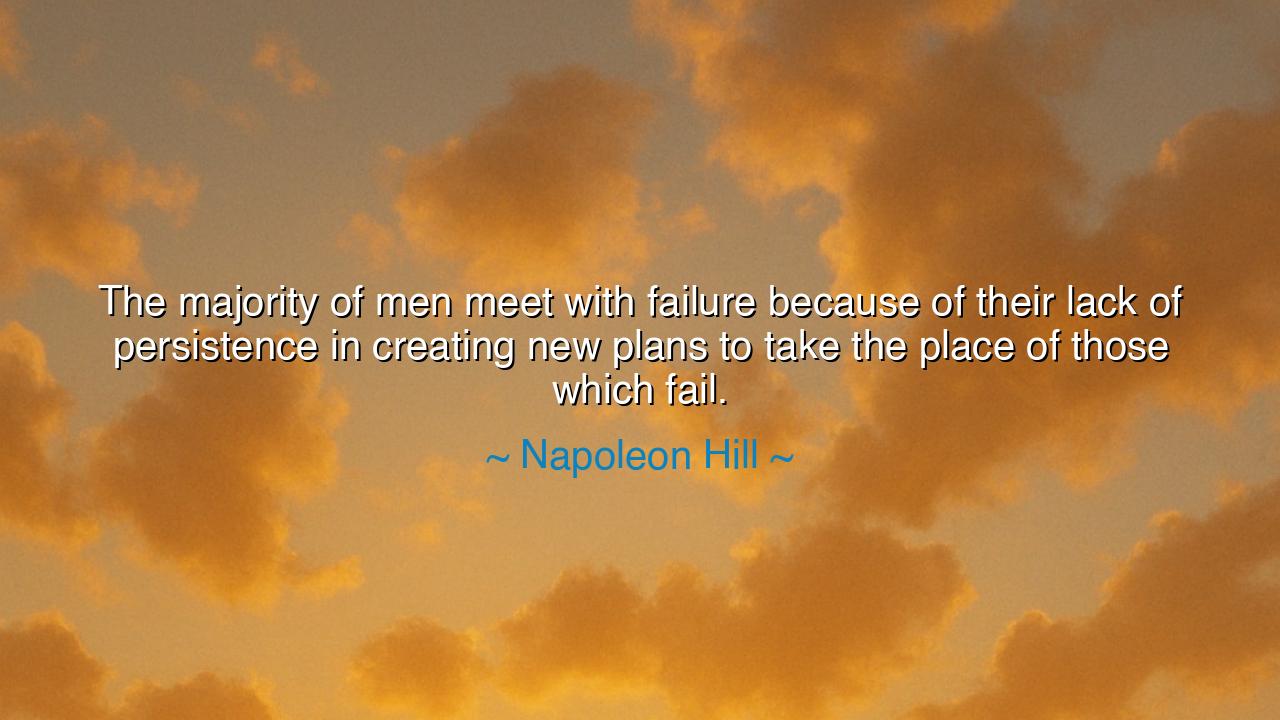
The majority of men meet with failure because of their lack of
The majority of men meet with failure because of their lack of persistence in creating new plans to take the place of those which fail.






Host: The gentle glow of the evening settled over the room, creating a serene and thoughtful atmosphere. Jack sat at the table, his fingers resting lightly on his cup, reflecting on Napoleon Hill’s words. Jeeny stood near the window, her gaze directed outward, contemplating the deeper meaning of the statement.
Jeeny: “I’ve been thinking about what Napoleon Hill said: ‘The majority of men meet with failure because of their lack of persistence in creating new plans to take the place of those which fail.’ It’s such an interesting perspective, isn’t it? The idea that failure isn’t the end, but often just a sign that you need a new approach. It’s the lack of persistence in finding that new plan that leads to failure, not the initial setback.”
Jack: “Yes, exactly. Hill is pointing out that failure isn’t the final word. In fact, most of the time, failure is simply a result of not having the right plan—or not being willing to adapt. Persistence is what separates those who succeed from those who don’t. When one plan doesn’t work, it’s about staying committed and finding a new strategy rather than giving up entirely.”
Jeeny: “Right. It’s easy to get discouraged when things don’t go the way we expect, but Hill is suggesting that true success isn’t about avoiding failure—it’s about being resilient enough to come up with a new plan. It’s about staying focused on the goal, even when the path isn’t clear. It’s like a dance with failure, where each misstep isn’t something to defeat you—it’s an opportunity to learn and adjust.”
Host: The stillness in the room deepened as they both reflected on how failure is often viewed as a final barrier, when in reality, it’s just part of the process. Jack’s fingers rested on the table, while Jeeny’s expression softened, considering how the ability to persist and adapt is what ultimately leads to success.
Jack: “It makes me think about how people often treat failure as an event that defines them. But Hill is showing us that failure is just part of the journey. What really matters is the ability to pivot and keep moving forward. The key is not letting failure stop you, but using it as a catalyst for finding a better way.”
Jeeny: “Exactly. The idea of creating new plans is so important. So many people give up after one setback because they’re not willing to adjust their approach. But Hill is telling us that the real power lies in being able to rethink and find a different route when things don’t go as expected. That’s where the persistence comes in—not in stubbornly holding on to the same plan, but in constantly re-evaluating and adapting.”
Jack: “And I think that’s what really separates people who achieve from those who don’t. The ones who keep adjusting their plans, keep trying new things, and keep learning from their failures are the ones who eventually find success. They understand that failure doesn’t define them—it’s the willingness to try again that makes the difference.”
Jeeny: “Yes, and it’s also about embracing failure as a part of the process. If we only focus on perfection, we’ll never be able to adapt when things go wrong. Hill is suggesting that the people who succeed are the ones who are flexible, who can look at a failure and think, ‘Okay, what now?’ instead of ‘Well, that’s it.’ The key is in the ability to adjust, to keep the end goal in mind while finding new paths forward.”
Host: The quiet in the room grew deeper, as they both reflected on the powerful role that persistence and adaptability play in success. Napoleon Hill had shown them that failure is not something to fear or avoid—it’s something to learn from, adapt to, and use as a stepping stone. Jack leaned back slightly in his chair, while Jeeny’s gaze turned from the window back to him, both of them understanding the vital role of persistence in overcoming setbacks.
Jack: “So, Hill is really showing us that success is about the process, not just the destination. Failure doesn’t mean the end—it’s just part of the ongoing effort to find the right approach. The real difference is in how we respond: do we let it stop us, or do we keep going, adjusting, and evolving?”
Jeeny: “Exactly. Persistence isn’t about just pushing through the same plan—it’s about learning from failure and creating new strategies. Hill reminds us that success is a journey of constant adjustment and growth. As long as we keep trying, we can find a way to reach our goals.”
Host: The evening had fully settled in, the quiet understanding between them a reminder that failure is not the end, but a part of the process. Napoleon Hill had shown them that the key to success is persistence, the ability to adapt and rethink strategies when faced with setbacks. The world outside had darkened, but inside, there was light—a recognition that failure is just a step toward success, as long as we’re willing to try again and keep moving forward.






AAdministratorAdministrator
Welcome, honored guests. Please leave a comment, we will respond soon